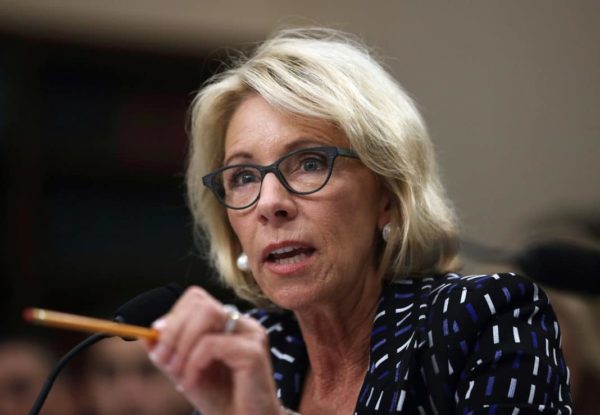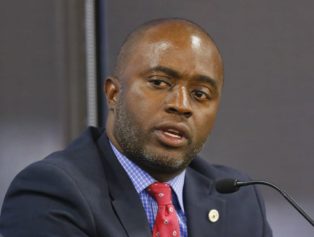
WASHINGTON, DC – MAY 24: U.S. Secretary of Education Betsy DeVos testifies during a hearing before the Labor, Health and Human Services, Education and Related Agencies Subcommittee of the House Appropriations Committee May 24, 2017 on Capitol Hill in Washington, DC. The subcommittee held a hearing on “Department of Education Budget.” (Photo by Alex Wong/Getty Images)
As the federal agency responsible for overseeing education from kindergarten through college, the policies adopted by the United States Department of Education have a major impact on the lives of American students. But in the Trump era, that impact could be a negative one. Budget cuts and personnel changes in the department could leave Black students at a disadvantage in the race to succeed academically.
In America, state and local laws govern most education policy issues. Thus, matters such as age cutoffs, the drawing of school districts, graduation requirements, and the like are decided by local actors. However, schools must also comply with federal regulations. The Department of Education is responsible for ensuring compliance with these laws.
Although federal education programs existed since the 1800s, the DOE became a cabinet-level department in 1979 when the Department of Health, Education, and Welfare was separated into two organizations — the DOE and the Department of Health and Human Services. The DOE’s charter states that the agency will be responsible for “ensuring access to equal educational opportunity for every individual,” as well as coordinating and implementing federal education policy. To that end, the DOE is responsible for “[Enforcing] federal statutes prohibiting discrimination in programs and activities receiving federal funds.” These laws prohibit discrimination based on race, color, national origin, sex, disability, and age.
The Office of Civil Rights (OCR) is the DOE subdivision with primary responsibility for enforcing these laws. Twelve OCR offices across the nation support its mission. The OCR is responsible for receiving and investigating complaints alleging discrimination at all types of educational institutions. A parent or student who believes that an educational institution has discriminated can file a complaint with OCR. The OCR will determine if the school has complied with the law. After its findings, the OCR will either attempt to negotiate a resolution between the parties or, failing that, initiate enforcement action which could result in the loss of federal funding for the educational institution.
Trump appointee Betsy DeVos is the current secretary of education. From the outset, she was critical of the DOE’s civil rights initiatives. During her confirmation proceedings, DeVos, who is the daughter of an industrialist father and is the wife of a billionaire heir to the Amway fortune, was asked if she saw current issues where the federal government might intervene. She responded, “I can’t think of any now.” This summer, DeVos, who never attended public schools nor sent her own children to any, doubled down on her position, stating that the under Obama, the OCR had “descended into a pattern of overreaching, of setting out to punish and embarrass institutions rather than work with them to correct civil rights violations.” She stated her intent to return the office “to its role as a neutral, impartial, investigative agency.”
Kenneth Marcus, Trump’s pick to lead OCR, is the founder of the Brandeis Center for Human Rights Under Law, which advocates against anti-Semitism and policies it views as anti-Israel. But during his Senate confirmation hearing this December Marcus was asked if he disagreed with any part of Trump’s civil rights agenda. He replied that he did not. Additionally, when questioned, Marcus did not agree that disproportionate punishments for Black and white students violate civil rights law.
Marcus’ nomination has not yet been confirmed.
Although the leadership leaves much to be desired, their priorities are of more concern than their personal politics. Currently, two initiatives at the DOE should concern the African-American community.
First, DeVos has announced a plan to reduce the staff at the OCR. Earlier this month, The Wall Street Journal reported that DeVos has authorized buyouts to 207 DOE employees. Of this number, 45 are in the OCR — the highest of any division in the DOE. When asked to explain the cuts, DOE staff responded that the OCR is the largest division in the agency and has many senior employees. However, critics responded that the cuts seem to be based on DeVos’ dislike of the agency rather than any need. Indeed, the OCR’s caseload increased significantly during the Obama era, which would seem to call for more staff, rather than a reduction in force. While the Obama administration did not increase staff, it also did not actively target the OCR for staff reductions.
The head of OCR during the Obama administration, Catherine Lhamon, told the Wall Street Journal, “I absolutely did not encourage departures, because I wanted absolutely everyone with civil rights expertise to stick around. … I didn’t feel like I could lose a single person.” Indeed, with DeVos’ cuts, the workload of each OCR employee will increase from 26 to 42 cases per person. An overworked and understaffed OCR will likely find it difficult to properly investigate its complaints. Indeed, Politico found that in the early days of DeVos’ tenure, the OCR closed 1,500 cases; 900 of these were closed without any proceedings. It is impossible to know for certain how many students were denied justice as a result.
Second, DeVos has rescinded Obama-era guidance intended to make the OCR look for systemic injustice. The Obama guidance directed OCR investigators to “expand individual complaints into broader reviews of schools and colleges to look for systemic civil-rights violations.” So, for example, if an African-American student was unfairly disciplined at school, under the Obama-era guidance, the OCR investigators were charged to look for other racially charged disciplinary incidents to determine if the action was a singular incident or part of a larger pattern of systemic discrimination. As author David Tomar noted in a post for The Best Schools, “The objective of the Obama guidelines was to produce investigations that illuminated and served to dismantle systematic obstacles to equality. The objective of the DeVos revisions is to limit the scope of such investigations, ultimately giving the schools themselves decisive authority over how investigations are pursued. … If there are systematic incidences of discrimination or inequality in our schools, DeVos would rather not know about them.”
African-American K-12 students are far more likely than their white peers to be disciplined at school. Racist and discriminatory incidents are increasing on college campuses as well. While not every incident will violate federal law, some might. Because Black students may face racism that potentially violates federal anti-discrimination law at any point in their education, students and their parents should be highly concerned about the changes at the DOE.
In the short run, the best-case scenario is that parents and students will have to wait patiently to have their grievances heard by the OCR. The worst-case scenario is that the DOE performs another purge and dismisses a number of cases without reason. In either case, parents and students would do well to keep records of all events in the investigatory process and seek professional legal help if they have reason to suspect or believe that their complaint has not been given a fair hearing. Moreover, though the DOE wants to prohibit investigations into systemic behavior, if parents band together and communicate, perhaps that information can be shared informally.
Education has long been the cornerstone of African-American advancement. Any effort to make education less equitable must be resisted.


